A delay in medical treatment compensation claim is for when you suffer due to an unnecessary delay in surgery, beginning medication, or getting an appointment for further testing.
Delays in treatment may be due to lost paperwork, a GP’s failure to refer you, or staff shortages within an NHS hospital. Delays in treatment may allow a cancer to spread, a cardiac condition to worsen or cause the effects of a stroke to be irreversible.
Any delay in treatment can be frustrating, but when the NHS does not meet its own targets, it could cause a danger to your health. You may have a compensation claim when you suffer a delay in medical treatment due to failures in the NHS.
Medical negligence is when you receive medical care below a level that any other medical professional would not provide. A delay in treatment may be medical negligence.
You may have a medical negligence claim for the effects of delay in medical treatment on your health today and in the future.
The Medical Negligence Team solicitors can take your No Win No Fee claim and seek compensation in a delay in medical treatment claim.
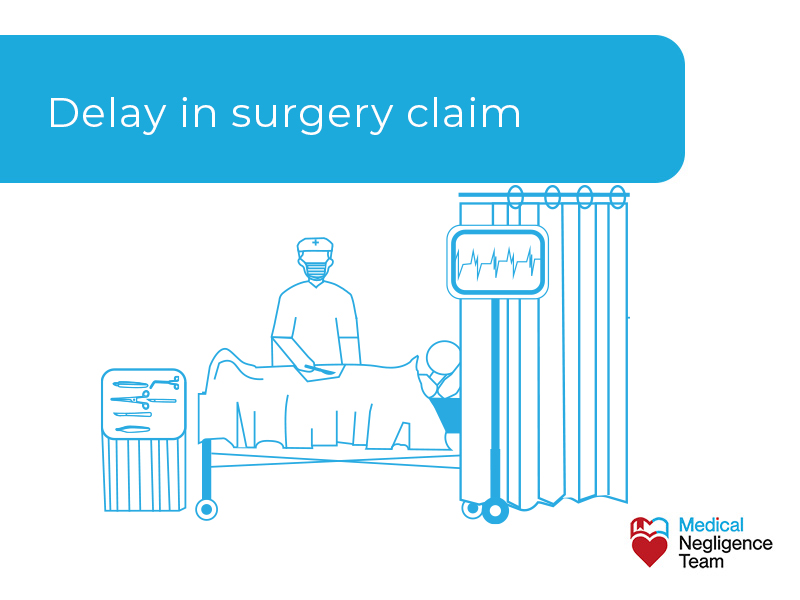
Table of Content
What is a delay in treatment claim?
A delay in treatment claim is when you seek compensation for the effects of the medical negligence on your life today and in the future. If the delay in treatment has affected your health or that of a loved one, you may have a delay in treatment claim.
Medical negligence is medical treatment below that any other medical professional would provide. If the delay in treatment is due to a poor standard of professional service by a doctor, GP, surgeon, or NHS hospital, you may have a delay in treatment compensation claim.
You make a claim for compensation for the breach of duty of care to you or a loved one by the medical professional. If you suffer when your GP fails to refer you for treatment, the surgeon does not schedule you for surgery, or NHS low staffing levels cause cancellations in vital treatment, you may have a medical negligence compensation claim.
A No Win No Fee medical negligence solicitor can make your claim for medical negligence compensation when you experience a delay in treatment.
Common delay in treatment claims
Common delay in treatment claims range from NHS waiting lists leading to a worsening in a condition to GP failure to refer errors and diagnosis errors causing a delay in beginning treatment.
If your health suffers due to a delay in treatment, you may have a medical negligence claim for compensation. You can claim for the breach of duty of care and its effect on your life today and in the future.
Common delay in treatment claims are:
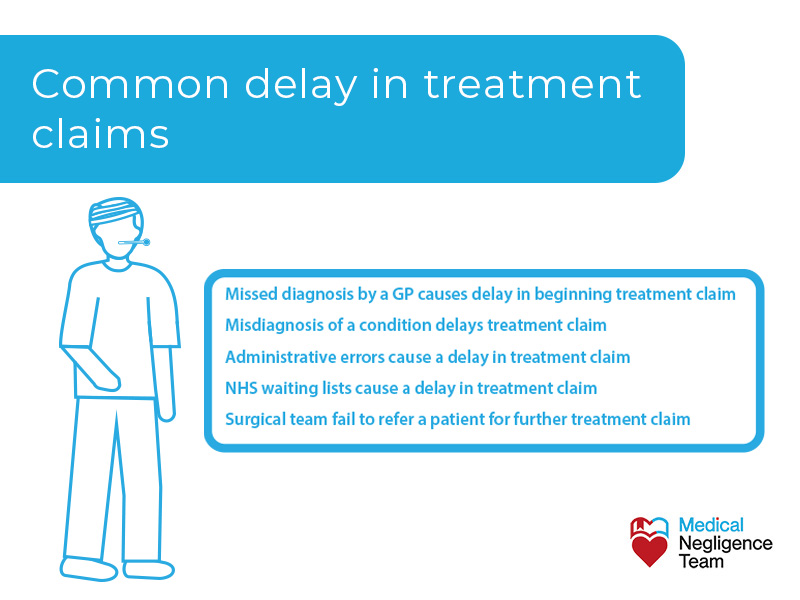
Missed diagnosis by a GP causes delay in beginning treatment
When a missed diagnosis by a GP causes a delay in beginning treatment, the patient may suffer when their condition goes unchecked. You rely on your GP to make a correct diagnosis so that you can begin the course of treatment.
The missed diagnosis may allow a cancer to spread in your body. A missed diagnosis of diabetes delays the treatment of it, and you may be very ill until a correct diagnosis is made.
You may have a claim for compensation if the medical negligence of a GP causes a delay in treatment.
Misdiagnosis of a condition delays treatment
The misdiagnosis of a condition delays treatment and the beginning of a correct course of medication or therapy.
If a medical professional puts you on the incorrect treatment path, it will only cause a delay in treatment for what is actually wrong with you.
You may be taking the wrong medication for months, which delays the beginning of the correct course. A delay in treatment for a muscle or nerve problem can cause an injury to worsen and increase the patient’s pain.
A delay in treatment claim can get you compensation for the medical negligence of a misdiagnosis of a condition.
Administrative errors cause a delay in treatment
Administrative errors cause a delay in treatment when your appointment with a hospital doctor is cancelled or not made for you. Your GP may forget to request the appointment, or the hospital department may cancel the appointment in error.
An administrative error may go unchecked for months. While you wait for an appointment, there is a delay in treatment, costing you valuable time in fighting your condition.
You may make a delay in treatment compensation claim if your health suffers due to an administrative error.
NHS waiting lists cause a delay in treatment
NHS waiting lists can cause a delay in treatment and often cause a delay in treatment to the most vulnerable patients. The NHS has set targets for tackling conditions such as cancer, and when it fails to meet these targets, you may suffer a delay in treatment.
A delay in treatment may be caused by appointments being cancelled due to staffing shortages. A failure to tackle waiting lists and staff shortages may be medical negligence by the NHS.
You may suffer a delay in treatment due to staff shortages in the A&E department, which may be serious in an emergency.
A medical negligence claim against the NHS for your delay in treatment may get compensation for the suffering caused.
Surgical team fails to refer a patient for further treatment
If a surgical team fails to refer a patient for further treatment, they may miss the chance to begin the next stage of recovery. Medical treatment after surgery may be a course of physical therapy, medication or follow-up consultations with the hospital doctors.
A delay in further treatment after surgery can delay the recovery of the patient and, in some cases, negate the effects of the surgery.
You may have a medical negligence compensation claim if the surgical team fails to prescribe further treatment after surgery and causes a delay in treatment.
A delay in treatment can cause problems with your health and allow a condition to worsen. Prompt treatment can be the first step in recovery, and a delay in treatment may cause a delay in recovery.
A No Win No Fee medical negligence solicitor can look at your case and see if you have a valid delay in treatment compensation claim.
Compensation for a delay in treatment claim
You can seek compensation for a delay in treatment claim in amounts from the low £10,000s to over £10 million in some cases. The delay in treatment can be due to GP error or NHS cutbacks, but a delay can have many effects on you, and you can claim for those effects today and in the future.
The compensation awarded when your treatment is delayed due to medication errors or errors made by a medical professional varies depending on several factors, such as how much discomfort and disruption you experience in your life today and in the future.
Claims sometimes see very high awards, such as when a patient becomes very ill due to delays in beginning treatment or suffers unnecessary pain and anxiety due to a missed diagnosis of cancer leading to a delay in treatment.
Compensation for delay in treatment negligence can see awards of:
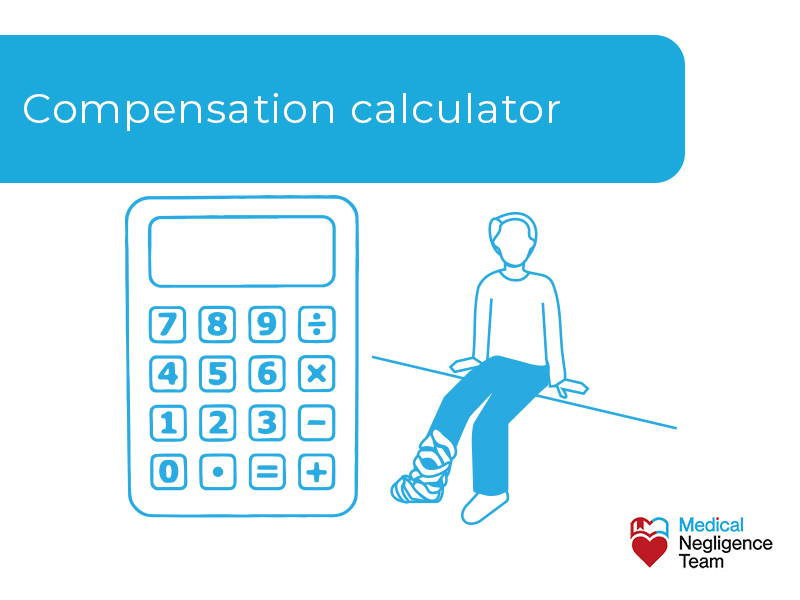
All amounts are approximate and are only a guide to what is possible in a delay in treatment claim. Figures can be high in some claims as you or a loved one could need long-term care, and you may face medical bills for life due to a delay in treating cancer or a delay in vital surgery for a cardiac issue when you first felt ill.
You may be able to claim for these care expenses and the medical costs in the future with a delay in treatment compensation case.
As in all medical negligence claims, each case is dealt with on merit and how much the patient suffers due to the medical negligence of the delay in treatment.
A No Win No Fee medical negligence solicitor will be the one to advise you on a delay in treatment claim. They will know from experience what your case may be worth and how to make a successful compensation claim.
Our Process
Our team members have a higher career win rate with a 75% success rate on NHS letters of claim, compared to an industry average of 54.5%.
Enquiry
The first step is to get in touch and tell us what went wrong. It’s free and easy. Call our 24-hour helpline: 0800 246 1122 or request a callback here.
Medical Evaluation
Once you have spoken with our team we’ll let you know how we can help. Typically the next step is to obtain your medical records for us to review.
Legal Letter
Once all your medical records have been received they will be reviewed by a medically & legally qualified member of our team. If there is evidence of negligence we will send a letter of claim to the negligent party outlining your compensation claim.
Who is eligible for compensation in a delay in treatment claim?
The patient who suffers pain and anxiety and sees their condition getting worse due to a delay in treatment may be eligible to claim compensation.
Medical negligence has made them ill, and the delay in treatment may also affect their recovery. A patient can claim compensation for the effects on their life of the delay in treatment and the medical negligence.
You are the one to suffer the pain, illness, constant nausea and other symptoms due to a delay in treatment and subsequent delay in recovery. A delay in treatment for cancer or diabetes can make the condition worse and delay effective treatment. The clear medical negligence could lead to complications for life and years of unnecessary suffering.
The medical negligence of a delay in beginning treatment may lead to psychological trauma, unnecessary pain and surgery. Medical negligence often has very severe consequences, and if a patient passes away due to medical negligence, the ones left behind may have a claim for compensation.
Loved ones in a medical negligence case are known as ‘dependents’ and can be:
When you have a delay in treatment claim, your No Win No Fee medical negligence solicitor can help make the case for compensation.
What can you claim for in delay in treatment negligence compensation?
You can claim compensation for any damages that occurred when you sue in a delay in treatment medical negligence case.
There are two types of compensation damages due when suing for any type of medical negligence, such as a delay in treatment when you are ill:

What medical conditions can get worse if treatment is delayed?
Medical conditions such as cancer and stroke can get worse if treatment is delayed. Every medical condition benefits from prompt treatment, and a delay in treatment will only be a setback in your recovery.
Medical conditions may need medical intervention, a course of the correct medication or a course of physical therapy as treatment and many conditions may need all three. Any delay in treatment or treatments will affect recovery and recovery times.
Medical conditions that can get worse with a delay in treatment:
There is a long list of medical complications that can quickly get worse with a delay in treatment. Any medical condition needs a course of treatment to resolve the issue, and a delay in treatment only slows recovery and may put a patient’s life in danger.
You may have a medical negligence claim for compensation if your medical condition gets worse due to a delay in treatment.
GP negligence leading to a delay in medical treatment
GP negligence leading to a delay in treatment may put your recovery on hold or even cause your condition to get worse. We rely on our GPs; they are often our first port of call when ill, and if they breach their duty of care to a patient, it can seriously affect their health.
GP negligence can lead to a delay in medical treatment when:
GP negligence can cause errors in your treatment and be responsible for a delay in treatment when they do not diagnose a condition or refer you for further treatment and testing.
A medical negligence claim may get you compensation when the GP causes a delay in treatment.
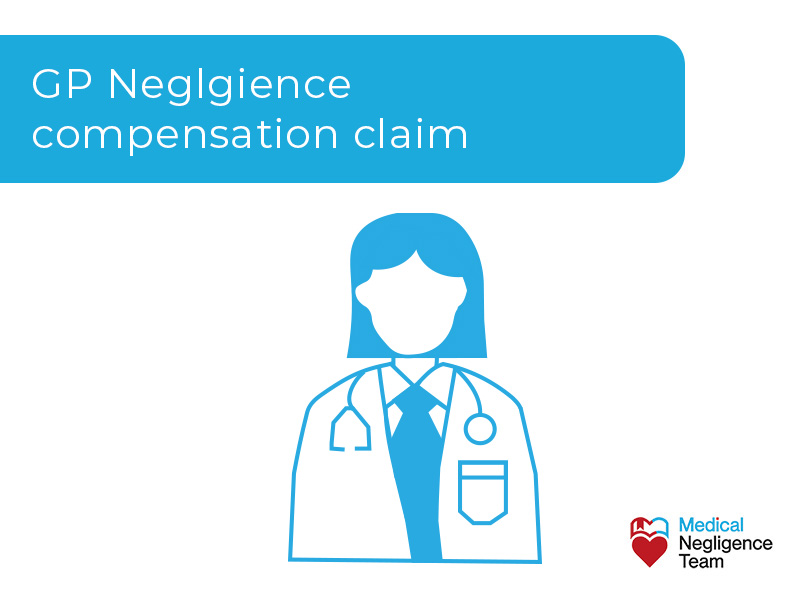
Delay in treatment due to a delay in surgery
A delay in treatment due to a delay in surgery happens when surgery is a necessary first step in treatment, especially so in an emergency. Surgery can treat the root cause of a condition, and any delays in surgery may have a severe effect on your treatment.
The medical professional responsible for a delay in surgery can be:
The delay in surgery will delay your treatment and the time you take to recover.
A delay in surgery can affect your condition when:
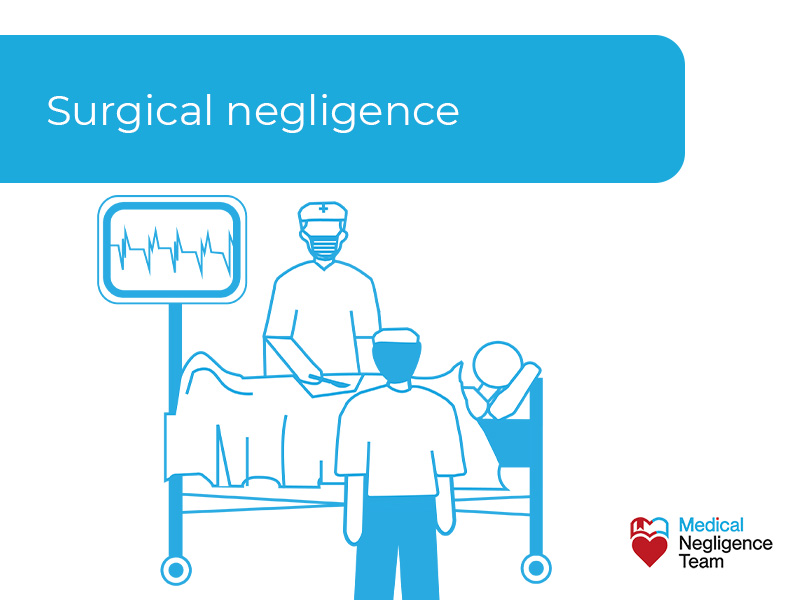
Delays in surgery can affect your recovery and cause an even further delay in treatment.
You may have a medical negligence claim for compensation when a delay in surgery causes a delay in treatment for your condition.
Delay in pharmaceutical treatment
A delay in pharmaceutical treatment will delay your treatment schedule and can cause a condition to get a lot worse and very quickly.
You should not have to suffer a delay in pharmaceutical treatment when ill, but when it happens, you may have a claim for delay in treatment negligence.
A delay in pharmaceutical treatment can have the effect of:
The delay in pharmaceutical treatment can happen when:
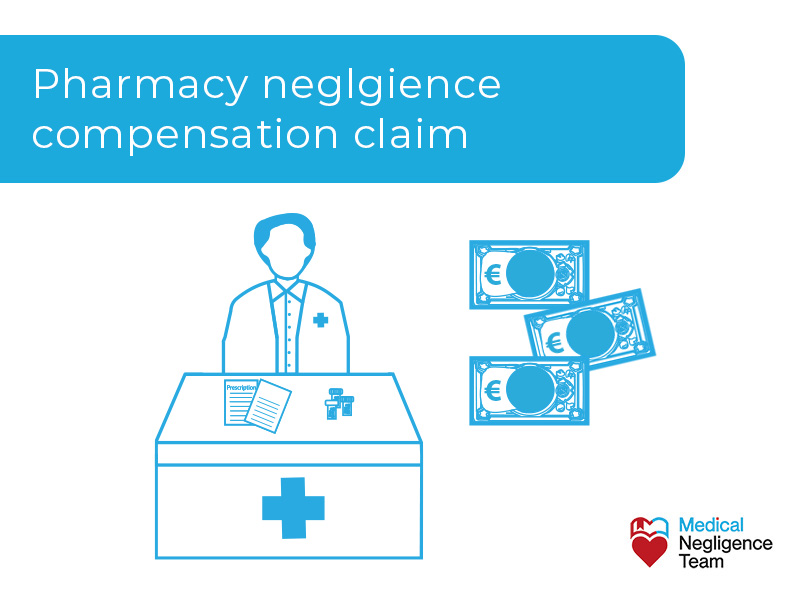
Pharmaceutical delays can have many effects, including delaying surgery and delaying the beginning of your treatment.
You can make a claim for medical negligence if you have suffered a delay in treatment due to errors with your medication.
How to make a claim for medical negligence
The steps involved in making a claim for medical negligence go from seeking medical advice to issuing court proceedings when a missed diagnosis of cancer causes a delay in treatment or medication errors cause a delay in treatment.
The steps are a part of any successful compensation case, and settlement can happen at any stage in the process.
Your medical negligence solicitor will do the rest when you follow the steps correctly and gather all the facts and figures.
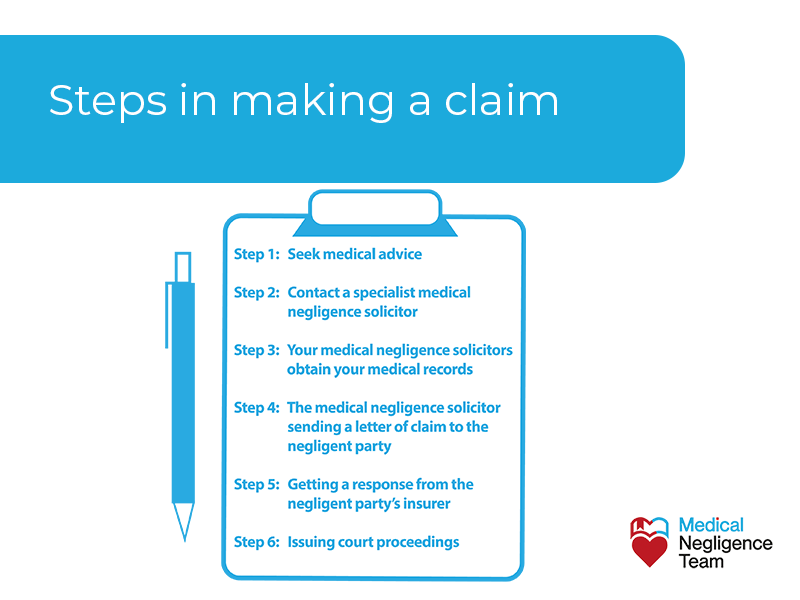
Our Process
Our team members have a higher career win rate with a 75% success rate on NHS letters of claim, compared to an industry average of 54.5%.
Enquiry
The first step is to get in touch and tell us what went wrong. It’s free and easy. Call our 24-hour helpline: 0800 246 1122 or request a callback here.
Medical Evaluation
Once you have spoken with our team we’ll let you know how we can help. Typically the next step is to obtain your medical records for us to review.
Legal Letter
Once all your medical records have been received they will be reviewed by a medically & legally qualified member of our team. If there is evidence of negligence we will send a letter of claim to the negligent party outlining your compensation claim.
How long do I have to make a claim for medical negligence?
You have three years to make a claim for medical negligence. All medical negligence claims are subject to limitation periods.
For example, in England and Wales, medical negligence cases for a delay in treatment must generally be brought and court proceedings issued within three years of the injury or three years of knowledge of the facts giving rise to the claim.
If someone has passed away due to a delay in treatment, it is the date of death if the limitation period has not expired by that time.
Children not under a disability typically have until they reach 21 to start a medical negligence claim or court proceedings.
Persons with a disability, who lack capacity, are not subject to any limitation period.
Will I have to go to court with a medical negligence claim?
No, you are very unlikely to have to go to court with a medical negligence claim.
The majority of cases are settled well before there is a need for court action, and NHS Resolution will see most cases are dealt with, in conjunction with your solicitor, before a referral to court by either side.
A delay in treatment can cause you and your family a lot of distress, and if you discover it is due to medical negligence, you will want answers and compensation for the effects of the treatment delays.
Your solicitor will want to keep the medical negligence claim out of court and get it settled in your favour as quickly as possible.
If your claim is one of the very few cases that do go to court, it will be handled by your No Win No Fee medical negligence solicitor.
Using a No Win No Fee medical negligence solicitor
Using a No Win No Fee medical negligence solicitor is the only way to a successful compensation claim for medical negligence. Your No Win No Fee medical negligence solicitor will not charge you for a claim you do not win.
The medical negligence solicitor will have experience dealing with the NHS and insurance companies when handling a delay in treatment claim. They will know what can be the causes of a delay in treatment, who causes the delay in treatment and what are the effects of a delay in treatment.
Your No Win No Fee solicitor will handle your compensation claim when you suffer a delay in treatment due to medical negligence and how to make it a successful compensation claim.
Always have a fee agreement in place before engaging a medical negligence solicitor. If they start talking of a ‘win fee’ or a ‘success fee,’ you should walk away. The negligent party insurers should pay all fees.
The medical negligence solicitor should also operate a 100% Compensation Guarantee scheme. When you win the case, all the money awarded should go to you, not the solicitor.
You are the one who experienced the medical negligence, and you deserve the compensation to get your life back to normal.

Contact The Medical Negligence Team
Contact the Medical Negligence Team today to discuss your claim for delay in treatment negligence. You suffered from the effects of a delay in treatment when beginning your fight against cancer, and you may be able to claim compensation for the medical negligence.
At the Medical Negligence Team, we fight every compensation claim on a No Win No Fee basis and you will not be out of pocket for an unsuccessful claim. We have both the legal and medical experts to guide you along the steps to a successful claim for compensation.
We have a very high success rate and a reputation for a speedy and successful resolution to delay in medical treatment negligence claims.
Our 100% Compensation Guarantee puts all the money you win into your pocket. You may have a compensation claim if you experience a delay in treatment due to a failure in making a diagnosis, referring you for testing and errors within the NHS.
Contact us at the Medical Negligence Team, and let us handle your claim for medical negligence compensation.


